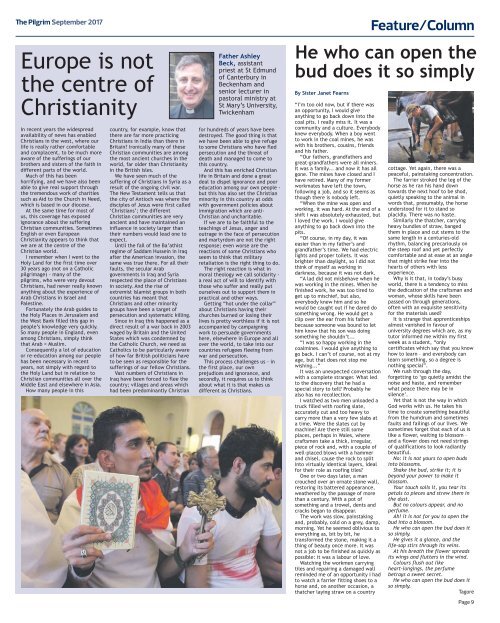Issue 64 - The Pilgrim - September 2017 - The newspaper of the Archdiocese of Southwark
The September 2017 issue of "The Pilgrim", the newspaper of the Archdiocese of Southwark
The September 2017 issue of "The Pilgrim", the newspaper of the Archdiocese of Southwark
Create successful ePaper yourself
Turn your PDF publications into a flip-book with our unique Google optimized e-Paper software.
<strong>The</strong> <strong>Pilgrim</strong> <strong>September</strong> <strong>2017</strong><br />
Europe is not<br />
<strong>the</strong> centre <strong>of</strong><br />
Christianity<br />
In recent years <strong>the</strong> widespread<br />
availability <strong>of</strong> news has enabled<br />
Christians in <strong>the</strong> west, where our<br />
life is really ra<strong>the</strong>r comfortable<br />
and complacent, to be much more<br />
aware <strong>of</strong> <strong>the</strong> sufferings <strong>of</strong> our<br />
bro<strong>the</strong>rs and sisters <strong>of</strong> <strong>the</strong> faith in<br />
different parts <strong>of</strong> <strong>the</strong> world.<br />
Much <strong>of</strong> this has been<br />
horrifying, and we have also been<br />
able to give real support through<br />
<strong>the</strong> tremendous work <strong>of</strong> charities<br />
such as Aid to <strong>the</strong> Church in Need,<br />
which is based in our diocese.<br />
At <strong>the</strong> same time for most <strong>of</strong><br />
us, this coverage has exposed<br />
ignorance about <strong>the</strong> suffering<br />
Christian communities. Sometimes<br />
English or even European<br />
Christianity appears to think that<br />
we are at <strong>the</strong> centre <strong>of</strong> <strong>the</strong><br />
Christian world.<br />
I remember when I went to <strong>the</strong><br />
Holy Land for <strong>the</strong> first time over<br />
30 years ago (not on a Catholic<br />
pilgrimage) - many <strong>of</strong> <strong>the</strong><br />
pilgrims, who were very devout<br />
Christians, had never really known<br />
anything about <strong>the</strong> experience <strong>of</strong><br />
Arab Christians in Israel and<br />
Palestine.<br />
Fortunately <strong>the</strong> Arab guides to<br />
<strong>the</strong> Holy Places in Jerusalem and<br />
<strong>the</strong> West Bank filled this gap in<br />
people’s knowledge very quickly.<br />
So many people in England, even<br />
among Christians, simply think<br />
that Arab = Muslim.<br />
Consequently a lot <strong>of</strong> education<br />
or re-education among our people<br />
has been necessary in recent<br />
years, not simply with regard to<br />
<strong>the</strong> Holy Land but in relation to<br />
Christian communities all over <strong>the</strong><br />
Middle East and elsewhere in Asia.<br />
How many people in this<br />
country, for example, know that<br />
<strong>the</strong>re are far more practicing<br />
Christians in India than <strong>the</strong>re in<br />
Britain? Ironically many <strong>of</strong> <strong>the</strong>se<br />
Christian communities are among<br />
<strong>the</strong> most ancient churches in <strong>the</strong><br />
world, far older than Christianity<br />
in <strong>the</strong> British Isles.<br />
We have seen much <strong>of</strong> <strong>the</strong><br />
suffering <strong>of</strong> Christians in Syria as a<br />
result <strong>of</strong> <strong>the</strong> ongoing civil war.<br />
<strong>The</strong> New Testament tells us that<br />
<strong>the</strong> city <strong>of</strong> Antioch was where <strong>the</strong><br />
disciples <strong>of</strong> Jesus were first called<br />
‘Christians’; <strong>the</strong> different<br />
Christian communities are very<br />
ancient and have maintained an<br />
influence in society larger than<br />
<strong>the</strong>ir numbers would lead one to<br />
expect.<br />
Until <strong>the</strong> fall <strong>of</strong> <strong>the</strong> Ba’athist<br />
regime <strong>of</strong> Saddam Hussein in Iraq<br />
after <strong>the</strong> American invasion, <strong>the</strong><br />
same was true <strong>the</strong>re. For all <strong>the</strong>ir<br />
faults, <strong>the</strong> secular Arab<br />
governments in Iraq and Syria<br />
respected <strong>the</strong> place <strong>of</strong> Christians<br />
in society. And <strong>the</strong> rise <strong>of</strong><br />
extremist Islamist groups in both<br />
countries has meant that<br />
Christians and o<strong>the</strong>r minority<br />
groups have been a target <strong>of</strong><br />
persecution and systematic killing.<br />
Since in Iraq this happened as a<br />
direct result <strong>of</strong> a war back in 2003<br />
waged by Britain and <strong>the</strong> United<br />
States which was condemned by<br />
<strong>the</strong> Catholic Church, we need as<br />
Catholics to be particularly aware<br />
<strong>of</strong> how far British politicians have<br />
to be seen as responsible for <strong>the</strong><br />
sufferings <strong>of</strong> our fellow Christians.<br />
Vast numbers <strong>of</strong> Christians in<br />
Iraq have been forced to flee <strong>the</strong><br />
country; villages and areas which<br />
had been predominantly Christian<br />
Fa<strong>the</strong>r Ashley<br />
Beck, assistant<br />
priest at St Edmund<br />
<strong>of</strong> Canterbury in<br />
Beckenham and<br />
senior lecturer in<br />
pastoral ministry at<br />
St Mary’s University,<br />
Twickenham<br />
for hundreds <strong>of</strong> years have been<br />
destroyed. <strong>The</strong> good thing is that<br />
we have been able to give refuge<br />
to some Christians who have fled<br />
persecution and <strong>the</strong> threat <strong>of</strong><br />
death and managed to come to<br />
this country.<br />
And this has enriched Christian<br />
life in Britain and done a great<br />
deal to dispel ignorance and poor<br />
education among our own people -<br />
but this has also set <strong>the</strong> Christian<br />
minority in this country at odds<br />
with government policies about<br />
immigration which are anti-<br />
Christian and uncharitable.<br />
If we are to be faithful to <strong>the</strong><br />
teachings <strong>of</strong> Jesus, anger and<br />
outrage in <strong>the</strong> face <strong>of</strong> persecution<br />
and martyrdom are not <strong>the</strong> right<br />
response; even worse are <strong>the</strong><br />
reactions <strong>of</strong> some Christians who<br />
seem to think that military<br />
retaliation is <strong>the</strong> right thing to do.<br />
<strong>The</strong> right reaction is what in<br />
moral <strong>the</strong>ology we call solidarity -<br />
a real act <strong>of</strong> will to identify with<br />
those who suffer and really put<br />
ourselves out to support <strong>the</strong>m in<br />
practical and o<strong>the</strong>r ways.<br />
Getting “hot under <strong>the</strong> collar”<br />
about Christians having <strong>the</strong>ir<br />
churches burned or losing <strong>the</strong>ir<br />
lives is pretty worthless if it is not<br />
accompanied by campaigning<br />
work to persuade governments<br />
here, elsewhere in Europe and all<br />
over <strong>the</strong> world, to take into our<br />
countries refugees fleeing from<br />
war and persecution.<br />
This process challenges us - in<br />
<strong>the</strong> first place, our own<br />
prejudices and ignorance, and<br />
secondly, it requires us to think<br />
about what it is that makes us<br />
different as Christians.<br />
Feature/Column<br />
He who can open <strong>the</strong><br />
bud does it so simply<br />
By Sister Janet Fearns<br />
“I’m too old now, but if <strong>the</strong>re was<br />
an opportunity, I would give<br />
anything to go back down into <strong>the</strong><br />
coal pits. I really miss it. It was a<br />
community and a culture. Everybody<br />
knew everybody. When a boy went<br />
to work in <strong>the</strong> coal mines, he was<br />
with his bro<strong>the</strong>rs, cousins, friends<br />
and his fa<strong>the</strong>r.<br />
“Our fa<strong>the</strong>rs, grandfa<strong>the</strong>rs and<br />
great-grandfa<strong>the</strong>rs were all miners.<br />
It was a family... and now it has all<br />
gone. <strong>The</strong> mines have closed and I<br />
have retired. Many <strong>of</strong> my former<br />
workmates have left <strong>the</strong> town,<br />
following a job, and so it seems as<br />
though <strong>the</strong>re is nobody left.<br />
“When <strong>the</strong> mine was open and<br />
working, it was hard. At <strong>the</strong> end <strong>of</strong> a<br />
shift I was absolutely exhausted, but<br />
I loved <strong>the</strong> work. I would give<br />
anything to go back down into <strong>the</strong><br />
pits.<br />
“Of course, in my day, it was<br />
easier than in my fa<strong>the</strong>r’s and<br />
grandfa<strong>the</strong>r’s time. We had electric<br />
lights and proper toilets. It was<br />
brighter than daylight, so I did not<br />
think <strong>of</strong> myself as working in<br />
darkness, because it was not dark.<br />
“A lad did not misbehave when he<br />
was working in <strong>the</strong> mines. When he<br />
finished work, he was too tired to<br />
get up to mischief, but also,<br />
everybody knew him and so he<br />
would be caught out if he dared do<br />
something wrong. He would get a<br />
clip over <strong>the</strong> ear from his fa<strong>the</strong>r<br />
because someone was bound to let<br />
him know that his son was doing<br />
something he shouldn’t...<br />
“I was so happy working in <strong>the</strong><br />
coalmines. I would give anything to<br />
go back. I can’t <strong>of</strong> course, not at my<br />
age, but that does not stop me<br />
wishing...”<br />
It was an unexpected conversation<br />
with a complete stranger. What led<br />
to <strong>the</strong> discovery that he had a<br />
special story to tell? Probably he<br />
also has no recollection.<br />
I watched as two men unloaded a<br />
truck filled with ro<strong>of</strong>ing slate,<br />
accurately cut and too heavy to<br />
carry more than a very few slabs at<br />
a time. Were <strong>the</strong> slates cut by<br />
machine? Are <strong>the</strong>re still some<br />
places, perhaps in Wales, where<br />
craftsmen take a thick, irregular,<br />
piece <strong>of</strong> rock and, with a couple <strong>of</strong><br />
well-placed blows with a hammer<br />
and chisel, cause <strong>the</strong> rock to split<br />
into virtually identical layers, ideal<br />
for <strong>the</strong>ir role as ro<strong>of</strong>ing tiles?<br />
One or two days later, a man<br />
crouched over an ornate stone wall,<br />
restoring its battered appearance,<br />
wea<strong>the</strong>red by <strong>the</strong> passage <strong>of</strong> more<br />
than a century. With a pot <strong>of</strong><br />
something and a trowel, dents and<br />
cracks began to disappear.<br />
<strong>The</strong> work was slow, painstaking<br />
and, probably, cold on a grey, damp,<br />
morning. Yet he seemed oblivious to<br />
everything as, bit by bit, he<br />
transformed <strong>the</strong> stone, making it a<br />
thing <strong>of</strong> beauty once more. It was<br />
not a job to be finished as quickly as<br />
possible: it was a labour <strong>of</strong> love.<br />
Watching <strong>the</strong> workmen carrying<br />
tiles and repairing a damaged wall<br />
reminded me <strong>of</strong> an opportunity I had<br />
to watch a farrier fitting shoes to a<br />
horse and, on ano<strong>the</strong>r occasion, a<br />
thatcher laying straw on a country<br />
cottage. Yet again, <strong>the</strong>re was a<br />
peaceful, painstaking concentration.<br />
<strong>The</strong> farrier stroked <strong>the</strong> leg <strong>of</strong> <strong>the</strong><br />
horse as he ran his hand down<br />
towards <strong>the</strong> next ho<strong>of</strong> to be shod,<br />
quietly speaking to <strong>the</strong> animal in<br />
words that, presumably, <strong>the</strong> horse<br />
understood for it to stand so<br />
placidly. <strong>The</strong>re was no haste.<br />
Similarly <strong>the</strong> thatcher, carrying<br />
heavy bundles <strong>of</strong> straw, banged<br />
<strong>the</strong>m in place and cut stems to <strong>the</strong><br />
same length in a centuries-old<br />
rhythm, balancing precariously on<br />
<strong>the</strong> steep ro<strong>of</strong> and yet perfectly<br />
comfortable and at ease at an angle<br />
that might strike fear into <strong>the</strong><br />
hearts <strong>of</strong> o<strong>the</strong>rs with less<br />
experience.<br />
Why is it that, in today’s busy<br />
world, <strong>the</strong>re is a tendency to miss<br />
<strong>the</strong> dedication <strong>of</strong> <strong>the</strong> craftsman and<br />
woman, whose skills have been<br />
passed on through generations,<br />
<strong>of</strong>ten with an exquisite sensitivity<br />
for <strong>the</strong> materials used?<br />
It is strange that apprenticeships<br />
almost vanished in favour <strong>of</strong><br />
university degrees which are, as my<br />
tutor informed me within my first<br />
week as a student, “only<br />
certificates which say that you know<br />
how to learn – and everybody can<br />
learn something, so a degree is<br />
nothing special”.<br />
We rush through <strong>the</strong> day,<br />
forgetting to ‘go quietly amidst <strong>the</strong><br />
noise and haste, and remember<br />
what peace <strong>the</strong>re may be in<br />
silence’.<br />
Yet that is not <strong>the</strong> way in which<br />
God works with us. He takes his<br />
time to create something beautiful<br />
from <strong>the</strong> humdrum and sometimes<br />
faults and failings <strong>of</strong> our lives. We<br />
sometimes forget that each <strong>of</strong> us is<br />
like a flower, waiting to blossom –<br />
and a flower does not need strings<br />
<strong>of</strong> qualifications to look radiantly<br />
beautiful.<br />
No: it is not yours to open buds<br />
into blossoms.<br />
Shake <strong>the</strong> bud, strike it; it is<br />
beyond your power to make it<br />
blossom.<br />
Your touch soils it, you tear its<br />
petals to pieces and strew <strong>the</strong>m in<br />
<strong>the</strong> dust.<br />
But no colours appear, and no<br />
perfume.<br />
Ah! it is not for you to open <strong>the</strong><br />
bud into a blossom.<br />
He who can open <strong>the</strong> bud does it<br />
so simply.<br />
He gives it a glance, and <strong>the</strong><br />
life-sap stirs through its veins.<br />
At his breath <strong>the</strong> flower spreads<br />
its wings and flutters in <strong>the</strong> wind.<br />
Colours flush out like<br />
heart-longings, <strong>the</strong> perfume<br />
betrays a sweet secret.<br />
He who can open <strong>the</strong> bud does it<br />
so simply.<br />
Tagore<br />
Page 9


















